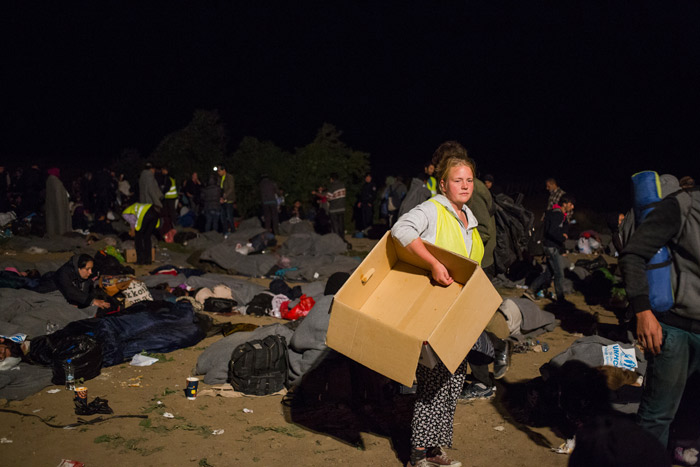The camp in Croatian Opatovac is the new bottleneck for Syrian refugees. There are sounds of frustration coming from people inside who are forced to stand in line day and night. And right in the middle of it is Vera Telemo, a student from Lund.
“Love is coming up!”, exclaims Kurdawan Chaomar, who used to be a restauranteur, as it is time to serve up a hot stew to passing refugees.
Around ten volunteers have built a soup kitchen by the road. A stone’s throw away stands around a hundred police officers who have formed a chain to stop thousands of refugees who want to leave Serbia for Croatia. Only a few hundred refugees are allowed to leave the massive line at a time, usually with many hours apart, to resume the 17 kilometres left to the refugee camp in Opatovac.
We drove sick children
In the group of refugees are children, old people and sick people. Sometimes there are busses to the refugee camp, but sometimes not.
“Yesterday we drove the sick and the small children. We chose the children under the age of four, but there were still so many that had to walk, perhaps 90 % of everybody”, says volunteer Vera Telemo from Fiskebäckil, Sweden.
It has been five days since student Vera Telemo made her way to Croatia by car. At the moment she is studying Environmental Science at Lund University and writes her Bachelor thesis on the tragedy of the commons. But in Croatia she helps the volunteer group “Hjälp Jocke att hjälpa” (“Help Jocke to help”). Today she is assisting two Swedish chefs and a restauranteur with chopping vegetables and handing out warm food.
“Anyone can help. Just grab hold of someone with a vest and ask what needs to be done. Most times it’s something as simple as handing out water bottles, make sandwiches or distribute blankets”, she says.
New arrivals are being met by the police
After travelling by bus or by foot, the newly arrived refugees are met by police. They push the refugees towards the line that leads to the refugee camp. Getting into the camp takes no time, but getting out again takes longer. It is crowded and chaotic at the exit – riot police are shouting and sometimes use pepper spray.
“Sit down! Sit down!” ”, one policeman screams with a baton in hand.
But the refugees have to go via the camp in order to get a seat on a bus to the Hungarian border. Buses are emptied and then filled again, but many think the process is too slow.
Inside the camp some Syrian men are sitting down next to green army tents, protesting. On red sitting pads, used as placards, they have written: “We are humans, not animals”, “let us out” and “Where is Europe!”. Omar Hayo is a Syrian fuel engineer and he says that the situation within the refugee camp is very bad. They, together with their friends, are considering fleeing.
“There’s too many people and the cueing system to the bus doesn’t work. And all the while, the police are treating us more like sheep than humans”, says Omar Hayo.
17 unconscious people are carried out
By the crowded exit, behind bars and barbed wire, 17 unconscious people are carried out within an hour. Sometimes on a stretcher or by police officers, one at each limb. There is a shortage of water, and at the same time there are families being split up when they are boarding the buses. According to Lydia Gall from Human Rights Watch, families being split up is a big problem, especially in Croatia.
The refugee camp is under close surveillance by the police and no one is allowed to leave. And at the same time the refugees are given no information on how long they have to stay.
But it is not only the screams of police officers and frustrated people that are heard around the camp. Sometimes playing children, people playing music and joking around cuts through the darkness. And the volunteers, with wholehearted involvement, also help to add a positive feeling to a catastrophic situation.
It is now night at the border and the police are letting through yet again another hundred refugees.
“Love is coming up!”, shouts Kurdawan Chaomar when it is time for the new stew to be served. Some of the refugees make an exhausted dash towards water and food before they hurry along to get seats on the last busses towards the refugee camp. There awaits yet more hours of uncertainty.
Translation: Emily Eriksson






